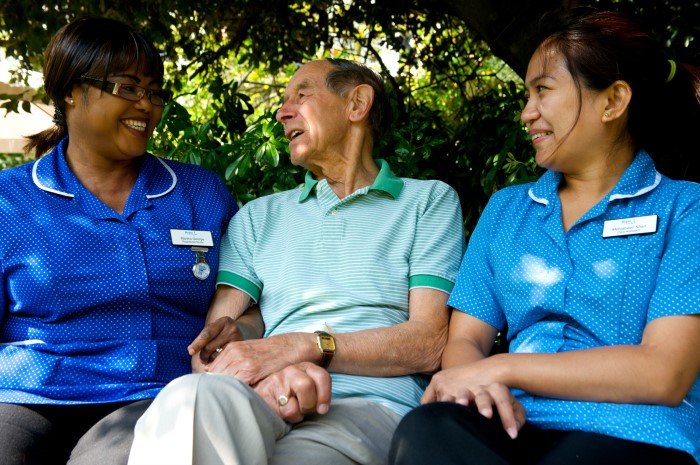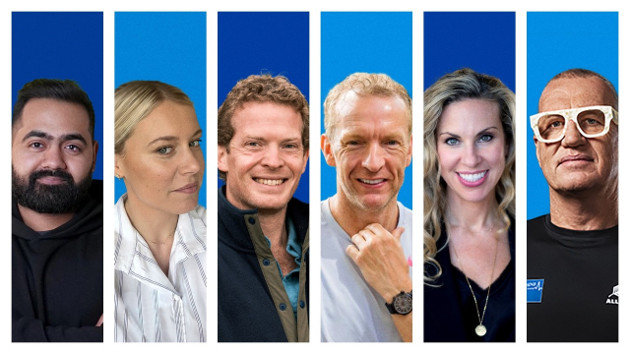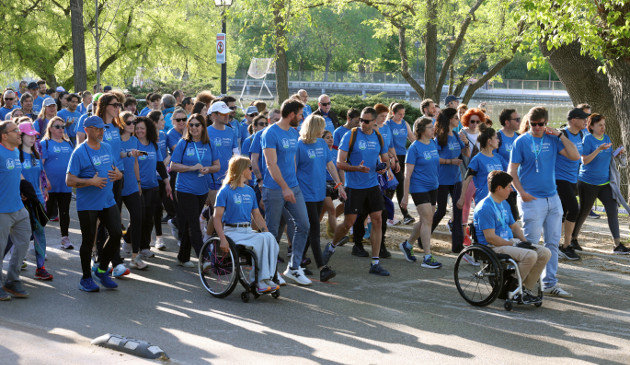
By Dr Julie Smith
Clinical psychologist, best-selling author and social influencer
Dr Julie Smith hears from Bupa teams around the world who have started wellness initiatives in their workplaces. Their stories are proof that even a small effort can make a big difference to individuals, teams and relationships.
In therapy we often talk about starting with the small things to improve wellness. It's a question of getting started – which is often the hardest part of making any change. In this article we're going to look at some of the ways Bupa teams have launched initiatives to promote wellbeing at work. They might even inspire you to try something similar with your own team.
Building basic everyday habits is the beginning of a journey that can lead us to bigger changes. It could be about exercise or diet. It could just be talking to someone or creating an environment that promotes open conversations and supportive teams. A great way to start doing this can be asking your team to come up with ideas, which makes it more inclusive, gets employees to buy into the scheme and hopefully produces more effective solutions.
‘Better Us. Better World’ in action
As part of the ‘Better Us. Better World’ programme, I talked to a number of Bupa team leaders about what they are doing to help their teams make changes to improve their wellbeing at work.
In the examples here you can see that these initiatives can and have had an effect, helping to drive positive change and confirming that any action – large or small – that makes work a better place to be is worth pursuing.
I like to think that just cracking open a door and giving people the confidence to start talking about how they're feeling is a great start to improve wellbeing at work. Let's hear Bupa’s success stories – and maybe they will be just the nudge you need to start making changes in your own team or workplace.
Bupa's wellness success stories
HealthRoster: giving care home workers control over their shifts
By Esther Nevill-Jones, Workforce Planning Manager, Care Services, Bupa UK
Tip: According to the Institution of Occupational Safety and Health in the UK, employers can alleviate some of the negative impact of shift work by planning shifts in advance, keeping patterns as flexible as possible and maximising worker autonomy.
We wanted to be able to give frontline staff in our care homes more say in when they worked so they could more easily find shift patterns that fitted around their lives. The eRostering system we use is called HealthRoster and allows colleagues to request shifts. It's powered by Workvivo, our intranet system. The main benefits are supporting a better work-life balance and empowering staff to influence their own rostering.
We ran pilot phases in a couple of homes, then rolled it out to 10 more homes and villages on a voluntary basis. Where it's been adopted it has had fantastic results and fears that staff would not request ‘undesirable’ shifts turned out to be largely unfounded.
We also found there were benefits for roster creators who face fewer changes after the roster has been approved. We continue to encourage uptake and we're also urging homes with patterned rosters to use it to ask staff to request additional shifts.
Supporting care home teams with personal energy training
By Guzman Bordallo Sainz, Regional Director, Sanitas Mayores, which represents Bupa in Spain
Tip: According to the study ‘Work related stress in Spain: An analysis about the current situation (2020/21)’, having the support of leaders is essential as this can help to improve employees' relationship with their work and increase their motivation. This can be encouraged by practices like collaborative work and social activities.
In 2022, I spoke to the head of psychology and HR team at La Zarzuela Sanitas Hospital and we designed on-site training to help teams balance personal energy and better understand how stress affects us all. We called this The Personal Energy Training Initiative: a pattern of training sessions in personal energy, stress management and mental balance.
After a successful pilot, we rolled out the Personal Energy Training Initiative to all six of our care homes, benefiting more than 300 people. Each care home organised between two and five one-hour training sessions to fit around different shifts.
Our goals were to provide the teams with new techniques to improve connections with residents and their relatives, increase the sense of pride in belonging to the Sanitas/Bupa family and facilitate collaboration between business units. We found measurable results via People Pulse, our internal survey that charts how people in Bupa are feeling at work. We also noticed many other benefits: employees were more likely to start exercising and taking part in sports, the work environment improved and there was more commitment to the company. The teams involved really enjoyed it and we feel that new, healthy habits such as exercising, going to bed early, eating well and respecting schedules are being adopted.
Creating a safe space to talk for a virtual team
By Beau Randall, Digital Team Leader, Customer Business Operations, Bupa Australia
Tip: The findings of ‘What really improves employee health and wellbeing: Findings from regional Australian workplaces’ concluded that: “An organisational culture which supported the psychosocial needs of the employees emerged as a significant factor in employee's overall wellbeing. Respectful personal relationships, flexible work, supportive management and good communication were some of the key factors identified as creating a health promoting working environment.”
We wanted to create a space to prioritise psychological wellbeing at work. With a team spread across four states in Australia an office day was never on the cards – even those employees in Queensland live more than two hours from the office – so we had to get creative.
The first step we took was to schedule regular team check-ins, with four 15-minute catch-ups per week, as well as two 40-minute team meetings and one 30-minute meeting per month. This helps us to stay connected despite how spread out we all are. I've always encouraged everyone to have their cameras on for these meetings so we can get a good feeling of connectivity.
Shared concerns
I wanted team members to also be able to share any concerns or issues they may be having on a more personal level too, so we have coaching sessions and one-to-one catch ups, which always start with an open conversation about what's going on in their lives. Adding the personal element really helps to forge a closer relationship. I take notes so I can keep those conversations going, stay up to date and build trust.
One person in my team has created a check-in style routine where they'll go and touch base with everyone individually on a regular basis too, just to make sure they're doing okay and to have a good chat at a peer level, to add extra support.
Other things we're doing include adding a link to a five-minute meditation to our Monday morning team email for those who wish to participate. For longer meetings, I try to bring a game or engagement activity to encourage team bonding and bring people a bit closer together in the virtual space.
Small things like these have brought our team closer together and I know that the check-ins give everyone a boost. At times, it even feels like we’re a closer team than I've worked with in office-based roles.
Appreciation/Compliments Board: boosting positivity with anonymous affirmations
By Jessica Livesey, Admin Support, and Tracey Cairns, Business Coordinator, Cedar Manor Care Home, New Zealand
Tip: According to a recent article in the Harvard Business Review: “Expressing praise and gratitude is particularly important for keeping up morale. Gratitude makes people feel valued, and positive feedback has been shown to mitigate the negative effects of stress on employee performance.”
Our aim was to make it easy for employees to show appreciation to each other and the solution was simple. We developed the Appreciation/Comments Board as a place to recognise each other anonymously. In one sense, it's just a whiteboard in reception. But it's also a way for love, recognition and positivity to permeate into our daily lives.
We have had comments championing each other's work (“Thank you for always being willing to help!”), celebrating personality traits (“Always so patient!”) and applauding individual roles (“You're doing an amazing job!”).
The staff have seemed brighter and more positive, even when writing about others, and there is visible delight when they see they have been recognised. Once the board is full we photograph it and wipe it. The laminated photo is then displayed in the staff room so the benefit of that joy is never lost. It's been a huge success and we will continue to do it.
Chinese New Year: celebrating diverse culture
By Alex Steele, Care Home Manager, Parkhaven Care Home, UK
Tip: According to the Diversity Council Australia, employees who work in an inclusive team are 19 times more likely to be very satisfied with their job than workers in non-inclusive teams.
Taking time to connect with each other is really important for the mental health and social wellbeing of our team at Parkhaven Care Home, and we organise monthly activities through our wellbeing programme.
To give an example, the staff arranged a celebration for Chinese New Year. They made Chinese dumplings and sweets together and enjoyed a lunch with the residents.
Not only does this kind of initiative bring staff and residents together, it allows us to celebrate our rich cultural diversity. The Chinese New Year event was a one-off organised by the wellbeing champions and kitchen staff, but we are now planning to celebrate more cultural days in the future.
The Chinese New Year celebrations brought so much joy to everyone and helped us all to connect in a fun and casual environment. We've learned that it's important to make the effort and take the time to celebrate each other, and it’s created a real warmth in the team.
Waking up to the value of wellness at Bupa
At a time when we're waking up to the value of our health, it's more important than ever to find ways to protect it at work – after all we spend a huge proportion of our days there. As the examples above illustrate, sometimes small things can make a really big difference. In fact it can even be better to start small.
The great thing is once you begin to make small changes, momentum begins to build and you can find things really starting to take off.
What all the above examples have in common is action. Someone has done something – no matter how small or big – and that leads to greater things. Giving people an opportunity hands them the ability to adopt healthier ways of living and working. And that is the key to starting a journey towards better wellness at work.
More about Dr Julie

Dr Julie is a clinical psychologist, best-selling author and social sensation. After running her own private practice for almost a decade, Dr Julie began sharing her digestible, informative videos on TikTok in 2019. Her often-viral videos cover a variety of mental health topics from anxiety and depression to confidence. Dr Julie has now amassed an audience of over six million and is the go-to online resource for mental health tips and tricks. Her debut book, Why Has Nobody Told Me This Before? was the bestselling non-fiction book of 2022. Dr Julie features regularly on This Morning and BBC Radio 1 Life Hacks.



